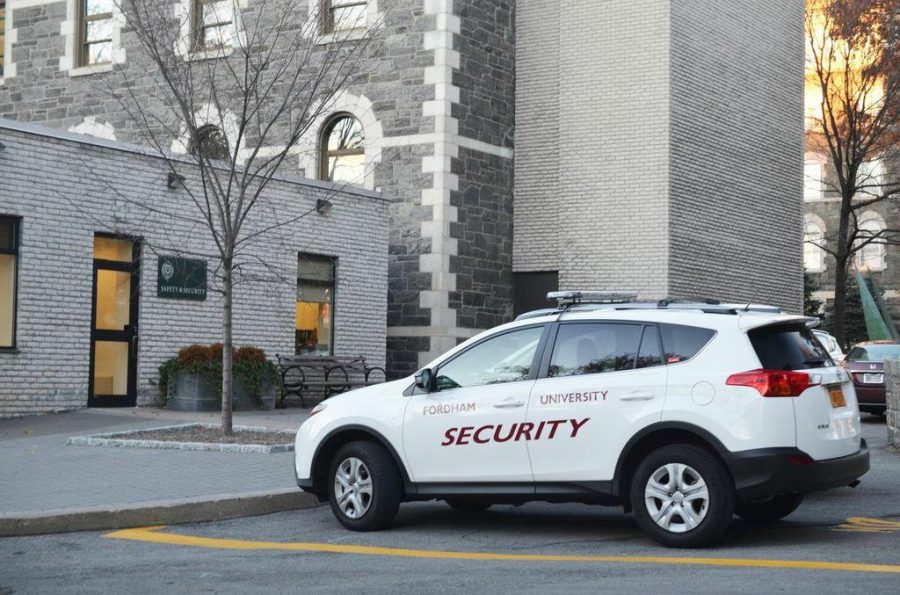By CONNOR RYAN
EDITOR-IN-CHIEF
Following an uptick in security alert emails sent to students this fall, members of Rose Hill’s United Student Government (USG) opened a dialogue with top-level security administrators last week in the hopes of shedding some light on Fordham’s often misunderstood process of packaging crimes into campus-wide broadcasts.
So far in 2013, 29 security alert emails have been sent to the Fordham community — more than the 23 emails sent in 2012 and even more than the 22 emails sent in 2011.
Students directed questions to John Carroll, associate vice president of Safety and Security, and Dan Kiely, director of security at Rose Hill, primarily about why certain crimes warrant security alerts and the circumstances under which race is included in the descriptions of alleged assailants.
Carroll said that email alerts are attached to crimes that represent “a continuing threat.” Most recently, for instance, off-campus iPhone thefts in which the burglar was not apprehended resulted in campus-wide emails with the hope that other students would be aware of the problem and take precautions.
“The worst thing for me would be if a person got robbed or mugged on the street and I didn’t put out a security alert and then another student got robbed or mugged by the same person,” Carroll said in between spurts of students knocking on tables (apparently, a longstanding tradition within USG that represents an expression of support or approval).
Fordham Security operates using the Jeanne Clery Disclosure of Campus Security Policy and Campus Crime Statistics Act, which is a federal law that pertains to colleges recording and disclosing crimes on and around campus.
The law requires that Fordham keep record of all crimes that pertain to criminal homicide, sex offenses, robbery, aggravated assault, burglary, motor vehicle theft and arson.
Additionally, the law requires that Fordham “issue timely warnings about [the above crimes] which pose a serious or ongoing threat to students and employees.”
Fordham’s own policy states: “The central purpose of the security alerts is to help members of the university community make informed decisions about their personal safety on or off campus.”
One student recalled an instance last March when her phone, along with another student’s, was stolen from the cafeteria in the McGinley Center.
There was no alert sent to the Fordham community, but the student said it seemed to represent an ongoing threat to other students.
“A lot of times students lose or misplace their property and they don’t pose continuing threats, so they don’t rise to that level,” Carroll said. “They don’t merit a security alert.”
He added: “A lot of times it’s bad mistakes, bad judgments that are better handled by Dean Rodgers and his staff than the cops. We’re not looking to elevate student misconduct into criminal activity.”
But, why not issue more alerts about cases of on-campus sexual assault? Some students challenged that a lack of notification regarding on-campus assaults may be perpetuating a sort of silent “rape culture” at Fordham.
Carroll responded by saying that victims of sexual assault often know the identity of their alleged attacker, and so Fordham security can take the appropriate action to deal with that individual student.
Carroll said that if Fordham knows the identity of the alleged attacker, there is no need to send a security alert because there is no continuous or ongoing threat. He added that often victims of sexual assault do not want to broadcast a security alert.
“Everybody has rights, and they should,” he said. “We will take the information from you, get you a support person and investigate the case very carefully. We’ll listen to you.”
On the question of whether race is included in the descriptions of alleged assailants, Carroll said that students are never directed by the security officials writing the incident report to provide certain details.
“We never prompt anybody [to distinguish race],” he said. “We simply listen to what they say. But one of the most challenging things is determining what the complainant actually saw.”
He said that race is often not included in security alerts because complainants cannot confidently recall descriptions of assailants. He then spoke about writing alerts from a moral perspective.
“We are looking to be more sensitive to things,” Carroll said. “If we are going to follow the Jesuit ideal, we’re not going to play into that stereotypical garbage.”
Of the 29 alerts emailed to students so far in 2013, race was mentioned six times — compared to the two times race was mentioned in 2012 (out of 23 alerts) and eight times in 2011 (out of 22 alerts), Carroll said.
He pointed out that many security alerts not sent to the Fordham community via email are published each week in The Fordham Ram. Students present at the meeting suggested the Office of Safety and Security send an email to students at the start of each semester reminding them of that.
Students also suggested more security alerts be published on Security’s website.
Aileen Reynolds, FCRH ’14 and the executive president of USG, said she was pleased with how the hour-long session went.
“We were able to address a myriad of topics relevant to the Office of Safety and Security, which led to interesting discussions,” she said in a statement. “Mr. Carroll was also extremely receptive to new suggestions and ideas for his office.”







































































































































































































